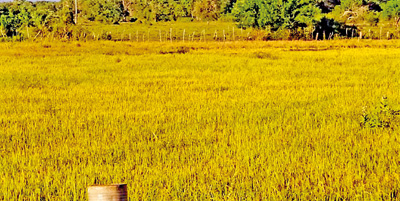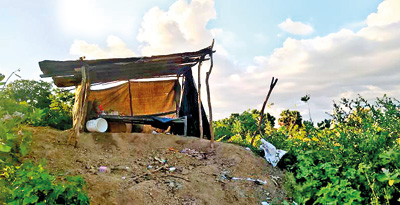News
Bear and elephant attacks strike terror in North’s mighty jungles

Where danger lurks: Paddy fields surrounded by thick jungle. Pic by N.Lohathayalan
Residents of Mannar are aggrieved at being left out of a recent meeting on wildlife issues at the Presidential Secretariat even though they in particular, and others in the Northern Province, which has the country’s greatest jungle cover, suffer the most from wild animal attacks.
Elephants, bears, leopards and serpents cause the most injuries and, as villagers ward off attacks, the animals too suffer: last year saw 200 elephants losing their lives.
Across the country last year, 122 people lost their lives in elephant attacks. In the first eight months of this year, the meeting at the Presidential Secretariat on August 27 was told, 62 people succumbed to elephant attacks.
In Mannar, some 2,500 families living in Vilaathikkulam, Iranai Iluppaikulam, Chinna Pandivirichaan, Periya Pandivirichaan, and Periyapathakulam and the surrounds of the Madhu Temple face the greatest threat and live in terror of wildlife attacks.
In Vavuniya District, the divisions of Vavuniya North and Chettikulam are severely affected, and in the areas of Nedunkerni, Palampaasi, Olumadu, Nainaamadu, Karappukkuththi, Vingnanakulam, Omanthai and Channar, and in Mullaitivu District the areas of Muththiankattu, Maankulam, Karippattamurippu, Othiyamalai, and Koolaamurippu, elephants are effectively daily guests coming to dinner.
In July, an elephant entered the Jaffna University’s Kilinochchi Campus and attacked a prized lecturer from the south, causing her death.
In the Madhu Divisional Secretariat in Mannar District, even the use of up to 300 giant explosive crackers a month is insufficient to chase off elephants, Divisional Secretary I Prathaban confessed.

Victims of bear attack
Mannar District covers 2002 sq km or some 500,000 acres, four-fifths of which is controlled by the Forests Department and a mere 93,360 acres used for human habitation and means of livelihood.
Unlike in most other districts, there are no fences to keep out elephants. A report by the Madhu Secretariat Division says a 190km fence would suffice to keep out elephants and provide safe human habitat in the area.
Bear attacks are particularly feared in the Madhu area.
At around 10 a.m. on July 15, 41-year old Nadarasa Mohanthas of Chinnavalaiyankattu in Mannar and his friend were attacked by a bear while they were looking for honey in the wilderness.
The bear first attacked the friend. In an attempt to save his friend, Mohanthas picked up a stick and struck the bear a blow. It growled loudly and engaged the two in battle, biting them both repeatedly.
Both men suffered huge wounds to their arms in the 30-minute conflict. Mohanthas, a father of three, has lost his capacity to fend for his family. “With these injuries to our arms, we can’t work,” he lamented.
Joseph Velu, 50, who lives on the Madhu Road near Pannai Vetuvaan, described how he escaped a bear this year on May 25.
“My family relies solely on paddy cultivation. On the day of the attack, my cows had strayed in the direction of the jungles. Fearing that leopards would prey on them, I followed them with two other friends around 3pm with the intention of chasing them back home.
“At the time we heard the noise of a different kind of animal. I told my companions to run but on account of my age and my inability to run fast or for long, I attempted to climb up a tree. 
“At that moment, a bear jumped up, grasped my leg in its mouth and pulled me down.”
Mr. Velu said he had managed to kick free but his leg had been torn open by the bear’s teeth.
“My wounds healed but I am still unable to walk,” he said. “As a result, my three children, wife and I struggle for our livelihood and can barely sustain ourselves.”
Last year, Navaratnam Yogeswaran was mauled by a bear, losing a leg and sustaining deep arm wounds. He and his family now live in hardship with a child working as a mason and his wife as a daily wage labourer.
Sivaguru Sivarajasingham, 45, was tending his fields in Mullikulam last year when he was attacked by a bear that came suddenly out of the jungles abutting his fields. Although he escaped with his brother-in-law’s help, he lost an eye and suffered severe injuries to his face and body.
The government gives Rs. 500,000 in compensation to families of people killed in wildlife attacks. Where no life is lost but a person is injured, a lesser amount is awarded. After this, affected families must fend for themselves, with no sustained help in their harsh environment.
This fate of being abandoned and alone does not befall only those who go into the jungles to earn a livelihood. Today, jungle-life is inexorably moving into settled villages, exposing the inhabitants to danger.
In the first eight months of this year, some 50 domesticated animals such as goats and cattle were carried away by leopards in the Madhu area while three more animals died in elephant attacks. Nine people and more than 40 cattle and goats were injured in attacks.
In the Mullaitivu District, three people have been killed in elephant attacks in the past four years and 140 acres of paddy land ruined, the District Secretariat said. Residents claim government machinery and the Forest Department move very slowly and engage in data-gathering and little else.

Farmers keep a look-out from these huts
Villagers allege rogue elephants from the south have been furtively brought into the Vanni jungles and that this is one cause of trouble. The head of the Nedunkerni Paddy Cultivators’ Association, V. Poopalasingham, said three people have been killed by elephants in Vavuniya North since the resettlement of alien elephants there.
Elephants now come deep into the town centre, Mr. Poopalasingham said. He pointed out that an elephant had even entered the hospital in Vavuniya North, as terrified patients scattered.
“More than 500 coconut saplings and thousands of papaw trees are dug up each day and administrators maintain a care-free silence,” he alleged. “They value elephants far more than our lives and livelihood. The hour of 6pm, in essence, brings a curfew as people huddle down in their homes, fearing to enjoy the outdoors. The one cause of all this is elephants,” Mr. Poopalasingham said.

